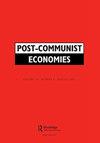考察政府支出对金融增长关系的影响:来自后共产主义经济体的证据
IF 1.8
3区 经济学
Q2 ECONOMICS
引用次数: 5
摘要
摘要本研究使用动态面板估计量考察了1995-2017年27个后共产主义经济体政府支出对金融增长关系的影响。许多转型经济体在转型初期试图减少政府干预的影响,同时改革各自的金融部门。研究结果表明,总体金融发展对经济增长是积极的,而政府支出对经济增长有负面影响。更重要的是,在政府支出水平较低的情况下,金融发展的边际效应对经济增长是积极的。相比之下,在高水平的政府支出下,金融发展与增长呈负相关。关注金融发展的不同方面,研究结果表明,与金融深度相比,金融准入和效率在刺激增长方面更有效。后共产主义经济体应确保政府支出不应排挤金融部门,并提高金融效率和可及性。本文章由计算机程序翻译,如有差异,请以英文原文为准。
Examining the impact of government spending on the finance-growth nexus: evidence from post-communist economies
ABSTRACT This study examines the impact of government spending on the finance-growth nexus in 27 post-communist economies from 1995 to 2017 using dynamic panel estimators. Many transitional economies have attempted to reduce the influence of government intervention during their early transitional period while reforming their respective financial sectors. The findings show that overall financial development is positive to growth, while government spending has a negative impact on growth. More importantly, the marginal effects of financial development are positive to growth at low levels of government spending. In contrast, at high levels of government spending, financial development has a negative relationship to growth. Focusing on different aspects of financial development, the findings show that financial access and efficiency are more effective at stimulating growth compared to financial depth. Post-communist economies should ensure that government spending should not crowd out the financial sector, and promote financial efficiency and accessibility.
求助全文
通过发布文献求助,成功后即可免费获取论文全文。
去求助
来源期刊

Post-Communist Economies
ECONOMICS-
CiteScore
4.90
自引率
18.20%
发文量
21
期刊介绍:
Post-Communist Economies publishes key research and policy articles in the analysis of post-communist economies. The basic transformation in the past two decades through stabilisation, liberalisation and privatisation has been completed in virtually all of the former communist countries, but despite the dramatic changes that have taken place, the post-communist economies still form a clearly identifiable group, distinguished by the impact of the years of communist rule. Post-communist economies still present distinctive problems that make them a particular focus of research.
 求助内容:
求助内容: 应助结果提醒方式:
应助结果提醒方式:


